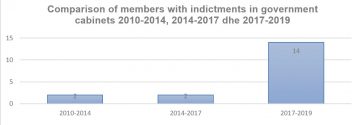Pristina, 6 September 2019 – Westminster Foundation for Democracy (WFD) in partnership with Kosovo Law Institute (KLI), funded by the UK Government, on Friday, published their report on “Government with Integrity: Comparative report of candidates with indictments in electoral lists of the years 2010, 2014 and 2017”.
The purpose of this report is to verify the number of individuals who were charged with indictments and against whom judgments regarding criminal offences had been announced, and still have been part of the electoral lists as candidates for MPs of the Assembly of the Republic of Kosovo, and who held cabinet positions in the three legislatures and governing periods in Kosovo during 2010 – 2014, 2014 – 2017 and 2017 – 2019.
Albert Krasniqi from WFD stated that what stands out most from this research is the growing trend of politicians who have problems with the law, who according to him are approaching public office, demanding public money management and making decisions on behalf of citizens.
Krasniqi stated that this is an indication of the decline of the ethical and moral standard of political parties, as it also affects the establishment of institutions that lack integrity to fight corruption and organized crime, at a time when the level of corruption in Kosovo is above the global average.
Betim Musliu from KLI presented the report findings, according to whom in the 2010 elections there were two candidates with indictments competing for MPs of the Assembly of the Republic of Kosovo, in the 2014 national elections, this number increased from two to fifteen (15), while in the 2017 national elections the situation further deteriorated with a total of twenty-seven (27) individuals in the electoral lists for the Assembly of the Republic of Kosovo.
Musliu made it known that the presence of individuals with indictments or judgments announced regarding criminal offences did not end only in the Assembly but was also reflected in the executive – the Government of the Republic of Kosovo. According to him, the findings show that within the government’s cabinet during the period 2010 – 2014 there were two senior positions against whom indictments were filed, same as within the 2014 – 2017 government cabinet, whereas, during 2017 – 2019 the situation gets worse, with 14 senior state officials, such as Ministers, Deputy Ministers and Deputy Prime Ministers.
According to the WFD and KLI report, the study and comparison of electoral lists according to years 2010, 2014 and 2017 based on institutional sources concludes that there is an increase in the trend of the inclusion of persons with indictments in Kosovo elections.
Comparison of candidates with indictments in elections during 2010-2014-2017
The report states that the same negative trend is noticeable for the government cabinet during these years, stressing that in many cases, although senior political party officials had no indictments at the time of their appointment to senior government positions, indictments were filed during their service and continued to work.
Comparison of members with indictments in government cabinets from 2010-2019
In this regard, WFD and KLI recommends that parties not include in the list of candidates for 2019 elections persons that have problems with the law, meaning persons under investigation, indicted or final court decision, the government cabinet deriving from the 2019 elections should have no persons under investigation, by indictment or judicial verdict, and after the election is over, party leaders should take joint or individual initiative to address this negative phenomenon once and for all.
Whereas, the recommended options for addressing this phenomenon based on international practices and Kosovo’s circumstances are the adoption of ethical rules and legislative prohibitions.



